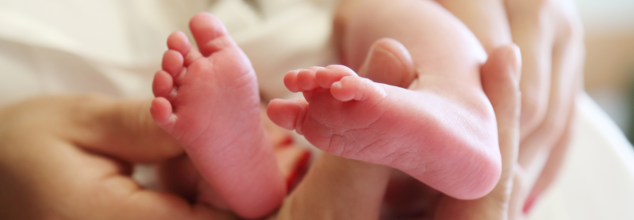- Health Conditions A-Z
- Health & Wellness
- Nutrition
- Fitness
- Health News
- Ayurveda
- Videos
- Medicine A-Z
- Parenting
US Fertility Rate Remains Below Levels Needed To Sustain Population Growth

Credits: Canva
The US is facing a long-term decline in the birth rates. As per experts, this raises a concern in terms of what this means for country's future, especially with regard to health of its population, economy, and caregiving systems.
A Slight Rise in 2024
As per the new data released by the US Centers for Disease Control and Prevention (CDC), more than 3.6 million babies were born in 2024. This is just a 1% increase from the previous year, which had been the lowest record in births. While this uptick may seem encouraging, it is not enough to reverse the troubling trend.
The US fertility rate remains around 1.6 births per woman. This is significantly below the 2.1 births that is required to sustain the population growth without immigration.
As per the demographers, this continuous drop began during the Great Recession in 2007. It has continued steadily since.
Shift In Teen Births
One of the biggest shifts is the steep decline in teen births. In 1991, about 62 of every 1,000 teenage girl had a child. This number has now fell to just under 13 by 2024. This is a historic low that reflects a positive shift, better education, access to contraception, and changing attitudes about early parenthood.
Similar trend is seen among women in their 20s, as the rates their too have dropped. In 2007, about 106 of every 1,000 women aged 20 to 24 gave birth. By 2024, the number has dropped to around 57. For women aged 25 to 29, the rate fell from 118 in every 1,000 women in 2007, to 91 in 2024.
Though there has been a slight rise in births among women in their 30s, experts say that it is not enough to offset the overall decline.
Are Births Being Delayed?
“One of the big questions is all these births that haven’t occurred—are they just being delayed?” asked Ken Johnson, a demographer at the University of New Hampshire. “Or are a lot of these births going to be forgone entirely?”
The answer has significant public health implications. A shrinking younger population could lead to fewer caregivers for an aging society, higher burdens on healthcare systems, and a smaller workforce contributing to national health programs like Medicare.
Why Are Fewer Americans Having Kids?
As per experts, while people still want children, there is a lingering financial burden and social barriers too that get in a way. High student loans, debt, and the rising coast of child care, unstable housing, along with limited access to paid parental leave are all major concerns.
“People don’t have kids when they don’t feel good about their own futures,” said Karen Benjamin Guzzo, a family demographer at the University of North Carolina.
Can Policies Help?
Some political leaders are proposing measures to encourage parenthood. Former President Trump, for instance, has suggested “baby bonuses” and scholarships for married couples or parents. However, Johnson believes that without stronger, systemic support, the U.S. birth rate is unlikely to bounce back to replacement level.
Immigration may help slow the effects of falling birth rates. Many immigrants move to the U.S. with plans to start families, Johnson noted. “They bring the potential for babies in the future.”
Zen Birth: Why Mothers Are Now Choosing This Over Delivery Rooms

Credits: iStock
For generations, childbirth has been closely tied to a certain visual and emotional script. Bright lights, clinical beds, beeping monitors, and an air of urgency have long defined labor rooms. Today, that script is being rewritten. Across hospitals and birthing centers, childbirth is undergoing a quiet but powerful aesthetic shift, one that places calm, comfort, and emotional safety at the center of the experience.
At the heart of this transformation is the growing popularity of warm water births and thoughtfully designed birthing spaces. As Dr. Preety Aggarwal, Medical Director of Obstetrics and Gynecology at Motherhood Hospitals, Gurugram explains, “From harsh hospital lights to calm, spa-like spaces, childbirth is being reimagined as a peaceful, deeply personal experience wherein tranquility takes center stage over tension.” What once felt intimidating is increasingly being shaped to feel intimate and reassuring.
From Medical Event to Life Experience
Childbirth has always been transformative, but for decades, the setting often heightened fear rather than eased it. Labor rooms were designed primarily for efficiency and medical control, not for emotional comfort. That approach is now evolving. More couples are actively seeking environments that respect birth as both a physiological and emotional journey.
“Childbirth is a one-of-a-kind experience. It is deeply transforming for the mother,” the doctor notes. This understanding has prompted hospitals to rethink how birthing spaces look and feel. Neutral colous, warm lighting, wooden textures, and minimal visual clutter are replacing stark whites and harsh fluorescents. The goal is not to eliminate medical safety, but to soften its visual dominance.
The rise of warm water birthing pools fits naturally into this shift. These pools are often placed in private, dimly lit rooms that resemble wellness studios rather than hospital wards. Gentle music, controlled lighting, and calming scents further enhance the sense of control and peace.
Why Warm Water Changes the Experience of Birth
Water has an innate ability to soothe. Immersion in warm water relaxes muscles, reduces physical tension, and encourages slower, deeper breathing. According to clinical observations, many women feel a stronger sense of control when laboring in water. The pool acts as a physical and psychological buffer, helping block out noise, distractions, and external stress.
The expert points out that water births are not only about comfort but also about reducing fear. Many mothers report feeling less anxious and more connected to their bodies during labor. This inward focus can make contractions feel more manageable and the overall experience more empowering.
Rephrasing this idea, the essence of water birth lies in its ability to support the body’s natural rhythm. Instead of fighting pain, women are encouraged to work with it, supported by warmth, buoyancy, and privacy.
Aesthetic Calm with Clinical Safety
One of the most common misconceptions about serene birthing environments is that they compromise safety. In reality, the shift is about balance. Modern birthing spaces are designed to keep medical equipment accessible but discreet. The focus is on emotional well-being alongside clinical readiness.
“There is a clear shift in attitude,” the doctor explains, adding that childbirth is no longer seen as just a medical event but as a life experience deserving emotional care. This change also reflects broader conversations around respectful maternity care, where the mother’s comfort, dignity, and choices are prioritized.
Creating a Zen Birth Experience
For expectant parents interested in this approach, preparation plays a key role. Choosing a hospital or birthing center that offers warm water birth options and calming room designs is the first step. Simple additions like soft lighting, calming music, and guided breathing techniques can make a noticeable difference.
Incorporating natural elements such as plants and warm colors helps create a grounding environment. Emotional support from a partner, doula, or trusted caregiver is equally important. A clear birth plan that balances comfort preferences with medical safety allows both parents and healthcare teams to work in harmony.
Redefining How Birth Feels
Warm water pools and serene birthing environments are changing more than the appearance of labor rooms. They are reshaping how birth is felt, remembered, and processed. By replacing tension with tranquility, this approach supports mothers in feeling calmer, more confident, and more present during one of life’s most intense moments.
As the expert advises, anyone considering this option should discuss it with their doctor and make informed decisions based on individual health needs. What is clear, however, is that the aesthetics of childbirth are no longer an afterthought. They are becoming an essential part of how birth itself is experienced, marking a meaningful shift toward gentler, more human-centered care.
What Is Denmark's 'Cry It Out' Method Of Putting Babies to Sleep?

Credits: iStock
Sleep training is a key to a good night's rest. This is especially true for the parents who are still new with handling their babies. One such method of sleep training, famous in Denmark is called the 'cry it out' method.
However, this method has been long in debates, Especially with one side saying that allowing babies to bawl does no harm, whereas, other sets of research and studies suggest that it impacts babies' emotional quotient. In fact, research suggest that leaving the babies to cry could have knock-on effects including damaging the bond between parent and child and raising the infant's stress levels.
However, recently, 723 Danish psychologists signed an open letter stating that cry it out sleep method, known as the "good night and sleep well" method in Denmark should be discouraged, as such methods may risk the attachment and child's development.
What Exactly Is The 'Cry It Out' Method?
This is also known as the extinction method, where rather than answering your little one's crying call as soon as it goes out, you give them the opportunity to independently work it out and nod off. This method is not intended to be cruel, it is meant to be used as an intentional tool to teach your baby self-soothing techniques that will stick with them for life.
Some also call it same as going cold turkey on your child. Parenting experts say that you put your baby in their crib, say goodnight and shut the door.
The Debate Of Those In Favor Of Cry It Out And Those Against It
A study led by researchers from the University of Warwick and published in the Journal of Child Psychology and Psychiatry, followed 178 babies and their mothers in the UK from birth to 18 months. Mothers regularly filled out questionnaires explaining how often they let their baby “cry it out” shortly after birth, and again at three, six, and 18 months.
Researchers also observed mother-infant interactions through video recordings at three and 18 months. At 18 months, they assessed children’s behavior and attachment using parent questionnaires, psychologist reports, and observations of play.
The results showed that most mothers rarely let newborns cry. However, by 18 months, around two-thirds allowed their child to cry sometimes or often. Importantly, babies who were occasionally allowed to cry as newborns tended to cry for shorter periods by 18 months.
No Clear Evidence of Harm
The team found no negative effects on the child’s emotional attachment, behaviour, or the mother’s sensitivity by 18 months. Based on these findings, researchers concluded that the practice does not appear to cause harm.
Professor Dieter Wolke, a co-author of the study, said parents may have worried unnecessarily about the issue. He suggested that debates around crying may have been exaggerated.
The Ones Against The Cry It Out Method
Not everyone agrees that the findings settle the debate. Professor Amy Brown from Swansea University, who was not involved in the research, warned that the results should be interpreted carefully. She noted that very few mothers in the study regularly used the “cry it out” approach, and the study did not examine how long babies were left to cry or how distressing parents found the experience.
She also emphasized that the research does not prove controlled crying is beneficial, nor does it address the emotional toll it can take on caregivers.
The Developing Infant Brain
Some researchers highlight concerns about stress in early life. A baby’s brain grows rapidly in the first year, and intense distress triggers the release of cortisol, a stress hormone. In high levels, cortisol may harm developing neural connections. While the effects may not be immediate, some experts question whether repeated distress could have long-term consequences.
Stress, Self-Regulation, and Trust
Infants rely on caregivers to learn how to regulate emotions. When caregivers respond quickly and consistently, babies learn calmness and trust. Comforting a distressed baby helps build the foundation for self-soothing later in life.
Critics argue that leaving babies to cry may teach them to shut down emotionally rather than truly self-regulate. Over time, this could affect how children respond to stress and relationships.
The Role of Caregiver Responsiveness
Decades of developmental research show that caregiver responsiveness plays a crucial role in positive outcomes such as emotional regulation, social skills, empathy, and even intelligence. When caregivers are sensitive to a baby’s signals, it supports healthy brain and emotional development.
Because responsiveness is so influential, experts stress that any parenting approach should prioritize attentiveness to a child’s needs. While occasional crying may not be harmful, consistent care and emotional availability remain central to healthy development.
Baby Born From Liver? Pregnant Woman In Peru Delivers A Child Through Ectopic Pregnancy

Credits: Canva
A 16-year-old mother in Peru delivered a baby who was in placenta that attached to her liver.
This is a rare milestone as the baby has been safely delivering from an abdominal ectopic pregnancy in which the placenta was attached to the mother’s liver.
The case involved 19 year old Valeria Vela, whose pregnancy continued to 40 weeks and resulted in the birth of a healthy baby girl. Health authorities in Peru say this is the first documented case of its kind in the country and only the fourth reported worldwide in which both mother and baby survived.
Understanding the Rarity of Ectopic Pregnancies
Ectopic pregnancies occur when a fertilized egg implants outside the uterus. In most situations, they develop in the fallopian tubes.
Around 96 percent of ectopic pregnancies happen there and only a very small number occur in the abdominal cavity. These pregnancies cannot safely continue because the organs where the egg may attach are not designed to support a growing fetus. In this case, the egg implanted directly on the liver, which meant the fetus relied on the liver’s arteries for blood supply. This created a situation that demanded extremely careful monitoring, as even small shifts in blood flow could have been dangerous.
The Challenges Doctors Faced
For doctors, the biggest challenge was the placenta. Removing a placenta that has attached itself to the liver can cause severe bleeding that can quickly turn fatal. Peru’s Health Minister Luis Quiroz Avilés explained that any attempt to detach it without preparation could have caused life threatening hemorrhage in the mother.
To manage this, the medical team used a technique that closes the arteries feeding the placenta by blocking their blood flow. This approach helped prevent massive bleeding during surgery and gave both mother and baby a chance at survival.
Another extraordinary aspect of this case was that the pregnancy reached 40 full weeks. Previous live abdominal ectopic pregnancies that resulted in birth reached only up to 36 weeks. Doctors followed Valeria closely through her pregnancy and relied on advanced imaging and interventional radiology techniques to keep the situation stable. According to local reports, the clinical management required constant coordination among specialists from obstetrics, radiology, surgery and intensive care.
A Baby Born Against All Odds
The baby, named Aylin, was born on November 30 and weighed 7.9 pounds. Officials revealed the case only after both mother and child were safely discharged from the hospital. Valeria is now in stable condition and recovering well, while Aylin is reported to be healthy.
Why This Does Not Change Standard Care
Although the case has been described as a medical milestone, specialists emphasize that such pregnancies are exceptionally rare. Most ectopic pregnancies cannot continue and trying to carry them comes with severe risks that include hemorrhage, organ damage and even death. For this reason, early diagnosis and timely intervention remain the safest and most widely recommended approach. This case highlights what is medically possible under very specific circumstances, but it does not change established guidelines for managing ectopic pregnancies.
© 2024 Bennett, Coleman & Company Limited

